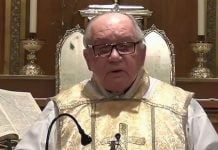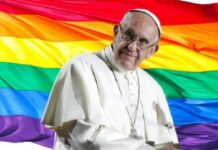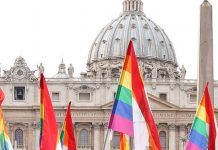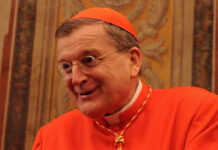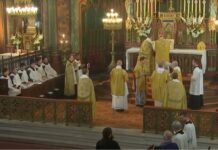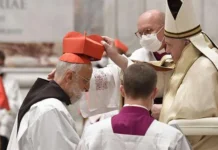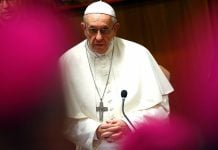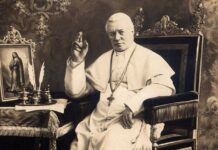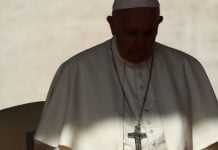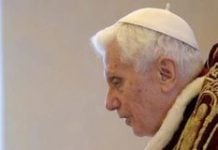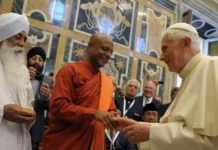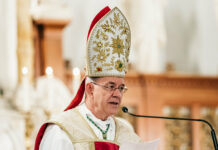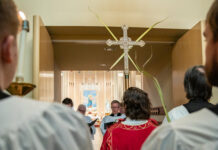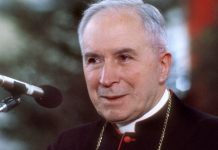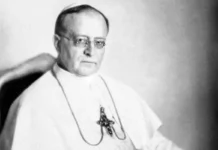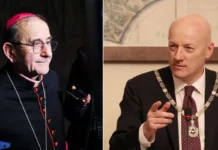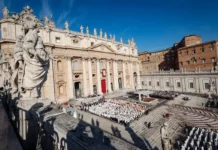4. The Ministry of Lay Readers in the Liturgy
The damage caused to the Church by the so-called promotion of the laity is incalculable and known to God alone. It seems it was taken for granted that Jesus Christ, Founder of the Church, had not promoted the status of the laity enough and, consequently, the faithful had remained in a state of pitiful prostration for twenty centuries.
Indeed, human nature has a virtually unlimited capacity to embrace any humbug, no matter how crazy it actually is.
These mischievous lies we have been talking about, caused in the Church by the Father of Lies, led to massive confusion within the two estates that make up the ecclesial Body: the clergy and the laity. Priests thought that they would be more priestly if they looked less like priests and more like lay people; lay people, in turn, thought that the more they became a type of half-priests the better lay people they could be. Consequently, both forgot their own charisma and failed to fulfill their specific obligations. Mentalities change with time when men lose the Faith; thus they forgot that wine is not so good when mixed with water (no one has ever thought that watered wine is true wine).
Another serious devastation brought about by these mischievous lies was that the faithful were misled as to the meaning of participation in the Mass. It was a veritable disaster, for the majority of lay people thought –as they were told—that their participation in the Mass was to take part in external, absolutely secondary or circumstantial activities (as distributors of the Eucharist, readers during varied liturgical functions, ministers of hospitality, etc.) that had almost nothing to do with the profound mystery of the Holy Sacrifice.
Once the sacrificial meaning of the Mass was lost with the introduction of the Novus Ordo, when the Holy Sacrifice ceased to be the re-production, here and now, of the Death of Jesus Christ in order to become a fellowship meal, the faithful ceased to realize that the Death of Christ is made actually present, although without the shedding of blood, in the Holy Mass. Consequently, they also rejected the realization that to participate in the Holy Sacrifice is to become intimately united to the Death of their Lord and to make it their own, such as they had previously made the Life of their Master their own. This participation will continue being real for them, the necessary graces being granted, throughout their daily life which becomes, ultimately, an extension of the Holy Mass.
Although this statement may prove especially painful, it must be said that the institution of the ministry of lay readers at liturgical functions (especially the Holy Mass) was another element that contributed to turning the Holy Sacrifice into a modest show.
Some lay people of restless spirit, fond of shocking novelties and eager to be promoted, saw themselves finally elevated and their status recognized by participating in the readings of the Mass. It was actually only a minority of people, since the vast generality of the laity kept enough common sense as to be satisfied with a situation which they considered honorable and with its own charism, without resorting to becoming a hybrid product which would only distract them from their natural duty to sanctify temporal activities; a duty that is their own and which only they can carry out, and which already provides them with more than enough importance and worries.
As for their participation as actors in what is not purely sacred but which is an additional and also ornamental part of the liturgical function, they do cooperate with special dignity when they serve as acolytes to the minister of the Holy Sacrifice or when they sing as members of the choir in solemn functions, etc; without forgetting that the real way to participate in the Mass is by being united mystically to the Sacrifice or bloodless Death of Christ that takes place on the altar.
I have personally known lay readers who would anxiously await the solemn moment of stepping up to the presbytery to read the appropriate readings of the Mass. I was somehow perplexed at the air of gravity and self-importance with which they read, with pompous voice and the conviction that they were carrying out the essential and most important moment of the Mass. I could see all too often, with no little sadness on my part, that they cared little about anything else of the Mass; they even seemed to believe they were the chief minister of the Holy Sacrifice.
To a certain extent, at least, they may be justified in feeling themselves important, but only when the mentionedlay ministers are women, mostly young and pretty. We must recognize that in this case the faithful attending the liturgical function in question tend to be more attentive to the person reading than to the contents of what she reads.
The outcome of all this, once again, is always the same: there is a certain desacralization of the liturgical function, as it loses much of its deserved solemn seriousness which contributes to raising the soul to supernatural realities; supernatural realities which suffer some deterioration when mixed, for no reason at all and without any justification, with natural realities; the same happens with good wine when mixed with water.
5. The important and serious problem of so-called Permanent Deacons.
When the nature of things is forced to a greater or lesser extent in order to obtain something new, the name given to the latter, with which it is often known, also is somewhat unnatural. He who receives the sacrament of Holy Orders, also in its lower degree or order which is the diaconate, becomes a cleric and deacon forever, even beyond death because of the character which the sacrament imprints on the soul of him who receives it.[1] Therefore, it is odd and shocking to consider as permanent some members of an entity or a class as if any members of that class could be considered transitory, or perhaps fleeting.
If it is said that the name was imposed with the intention of signifying that permanent deacons were never going to attain the degree of priesthood, one could simply respond that this indication was something unnecessary …, besides not being entirely truthful.
Unnecessary in that it is still an abnormal way of using language. For instance, what would happen in the Army when certain degrees of the military ladder, which by their own nature or due to other circumstances will never rise beyond non-commissioned officers, for example, were called permanent sergeant, for instance? It would certainly be ridiculous.
Insincere because, as we will explain later and despite the fact that nobody wants to acknowledge this, it was intended from the outset to ordain these deacons to the priesthood while keeping their married status; with the intention, of course, of providing for the dire shortage of priests … but also to help discard the Church’s millennial treasure of priestly celibacy.
The shortage of priests is a real problem in the Church that has been around for too many years. South American countries, especially Brazil, have a severe and urgent need for priests which is not easy to solve; this is absolutely true.
But this is not the root of the problem. And the real, bottom-line issue must be confronted if we want to solve the problem … though no one is actually thinking of doing so.
The lack of priestly vocations in the Church is due to several things, the main reason being the depreciation of the image and the role of the priest. The Church herself has contributed to this depreciation by allowing the so-calledidentity crisis of the priesthood, as concocted by modernist and post-conciliar theologians and fed with ideas derived from the Second Vatican Council. The Church did not pay attention to the tremendous priestly crisis that arose immediately after the Council, and she began to grant easy secularization; next she abandoned priests to their fate, without providing them with a clear and forceful Magisterium or with the necessary care to withstand the onslaught of a secularized and de-Christianized world; she did not supervise the formation imparted in the Seminaries or the doctrine taught at the Ecclesiastical Faculties of Theology, etc.
This Church, which had lain prostrate for too long, having lost the spirit of prayer, was unable to remember that Jesus Christ had given the solution to the problem when He said that since the harvest was abundant and with few laborers, it was necessary to ask the Lord of the harvest to send laborers into the harvest.[2] But the Church had opened herself to the world and put aside supernatural solutions in order to put in place a New Church in which man would be worshiped with merely human doctrines and procedures.
Thomism was abandoned and replaced by currents of thought sprung from the Enlightenment; Revelation was questioned, Magisterium despised; the doctrine of the Fathers was branded as obsolete; Tradition was no longer considered a source of Revelation. Liberal Protestantism was chosen first and then blatant Modernism, especially after the Second Vatican Council. At this time, seminaries and novitiates began to empty; Catechesis and Catholic Education disappeared. As for the clergy, they began to doubt their identity; the idea that the hour of the laity has come was now hammered into their brains; they felt abandoned by a Hierarchy which had lost much of its prestige and which neglected its duty to provide grazing ground for its sheep and save them from all dangers; consequently, they opted for dispersion and apostasy. The convents soon became empty; the nuns –even cloistered nuns—went out into the world to bear witness; churches and parishes were desolate without priests to take care of them, and the average faithful were left confused.
Against this background, how could there not be a scarcity of vocations?
It has been a long time since the leaders of the Church began to look the other way, refusing to recognize the causes of these problems because they did not want to face the real solutions. Instead, patches and piecemeal answers were concocted; even, which is much worse, useless and harmful solutions despite their appearance of holding the key to the problems.
But patches and piecemeal remedies almost never solve anything; on the contrary, very often they worsen the situation. The institution of permanent deacons smells like a solution that would disregard a centuries-old Doctrine and Spirituality to break new ground, apparently good and also appropriate, to deal with the modern challenges faced by the Church. But it is difficult to try to replace structures considered stale and traditional, although rooted in the Doctrine of the Founder of the Church, with new doctrines, considered more powerful and appropriate for the present problems. Jesus Christ already said that no man putteth new wine into old wineskins: otherwise the new wine will break the skins, and it will be spilled, and the skins will be lost.[3]
(To Be Continued)
Fr. Alfonso Gálvez
[1]According to the Doctrine of the Church, a sacramental character is the seal or the supernatural mark that three of the seven sacraments, Holy Orders, Baptism, and Confirmation, imprint on the soul and which, being indelible, remains beyond death, for all eternity.
[2] Lk 10:2.
[3] Lk 5:37.





